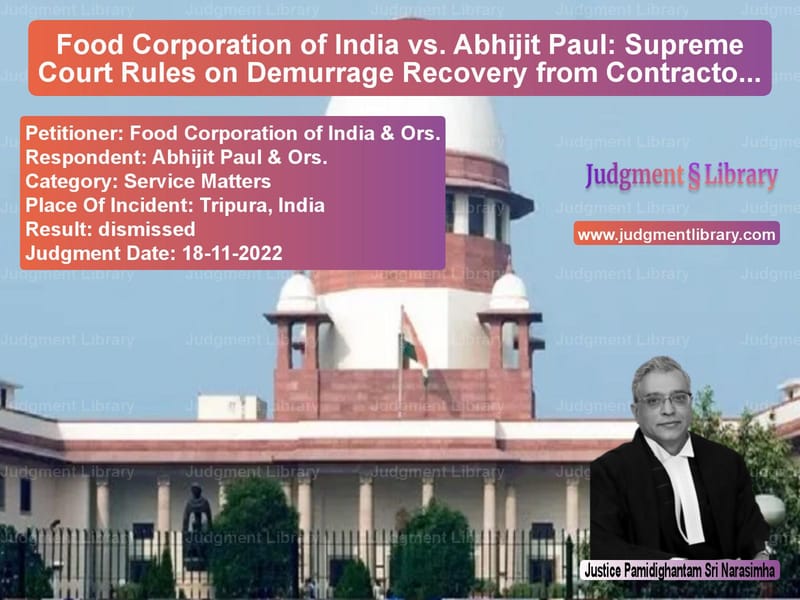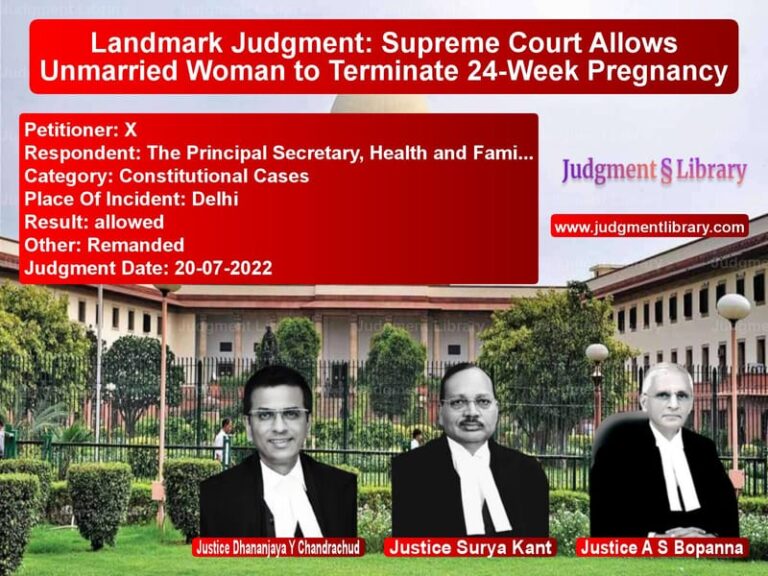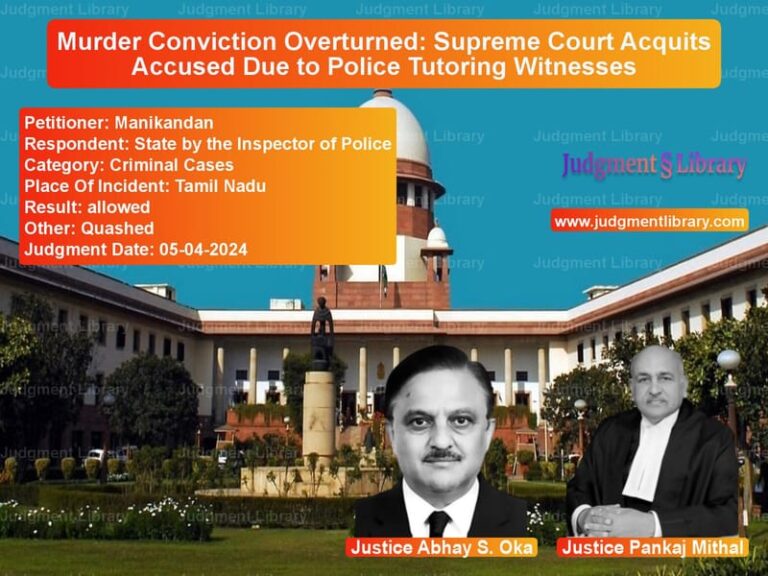Food Corporation of India vs. Abhijit Paul: Supreme Court Rules on Demurrage Recovery from Contractors
The Supreme Court of India recently delivered a significant ruling in the case of Food Corporation of India & Ors. vs. Abhijit Paul & Ors. The dispute centered around the Food Corporation of India (FCI) attempting to recover demurrage charges imposed by Indian Railways from its transport contractors. The ruling clarifies key contractual principles and affirms that liability for demurrage must be explicitly defined in the contract.
The Supreme Court upheld the Tripura High Court’s decision, ruling that the term “charges” in the contract did not include demurrage. Consequently, FCI could not unilaterally deduct such charges from contractors’ payments or security deposits.
Background of the Case
FCI, a government entity responsible for procuring and distributing food grains across India, frequently engages transport contractors to move grains from railway sidings to storage depots. In this case, FCI had entered into a contract with Abhijit Paul for transporting food grains from Churaibari railway siding in Assam to the Food Security Depot in Tripura.
The contract included a clause (Clause XII(a)) allowing FCI to recover “charges” for losses due to negligence or non-performance by the contractor. When Indian Railways imposed demurrage charges on FCI due to delays in unloading food grains, FCI sought to recover the amount from the contractors by withholding their security deposits.
The contractors challenged this action, arguing that demurrage charges were not part of their contractual obligations and that FCI’s action was arbitrary and unlawful.
Arguments by the Parties
Appellant (Food Corporation of India)
- FCI argued that the contract allowed them to recover “charges” resulting from the contractor’s actions, including demurrage.
- The corporation claimed that delays in unloading food grains led to financial losses, and since the contractors were responsible for transport logistics, they should bear the liability.
- FCI cited previous contracts where similar charges had been deducted, arguing that this practice was well established.
Respondent (Abhijit Paul & Other Contractors)
- The contractors contended that their contract did not explicitly mention demurrage and thus, they could not be held responsible.
- They argued that unloading food grains was FCI’s duty, and they were only responsible for transport.
- The respondents maintained that FCI’s unilateral deduction violated fundamental contract principles and was an abuse of power.
Key Observations by the Supreme Court
The Supreme Court analyzed the contractual clauses and held that:
- The term “charges” in Clause XII(a) must be interpreted in context. Since demurrage was not explicitly mentioned, it could not be included.
- Transport contractors were not responsible for unloading food grains at railway sidings; this was FCI’s responsibility.
- FCI’s unilateral action of withholding security deposits to recover demurrage was unlawful.
The Court stated:
“The term ‘charges’ cannot be arbitrarily interpreted to include demurrage when no such liability has been imposed on the contractor by contract. Recovery of such charges without explicit contractual authorization is impermissible.”
Judicial Precedents Cited
The Court referred to multiple precedents to support its ruling:
- Union of India vs. Raman Iron Foundry: The Court reiterated that contract terms must be interpreted as a whole, not in isolation.
- State of Karnataka vs. Shree Rameshwara Rice Mills: The judgment reaffirmed that unilateral determination of liability by one party is impermissible.
- Bihar State Electricity Board vs. Green Rubber Industries: The case was cited to emphasize that contract interpretation should be based on its purpose and the intent of the parties.
Final Verdict
The Supreme Court dismissed FCI’s appeals and upheld the High Court’s ruling. The key directives included:
- FCI cannot recover demurrage charges from transport contractors under existing contracts.
- Security deposits wrongfully withheld must be refunded to the contractors.
- FCI may pursue alternate legal remedies for loss recovery if permitted under contract law.
Impact of the Ruling
This judgment has far-reaching implications for contract enforcement in public-sector logistics and supply chain agreements. Key takeaways include:
- Need for Precise Contracts: Government entities must draft contracts clearly, defining liabilities explicitly.
- Protection Against Arbitrary Deductions: The ruling prevents organizations from unilaterally imposing financial penalties without contractual backing.
- Judicial Oversight: The judgment reaffirms that courts will intervene when public authorities overstep contractual boundaries.
Conclusion
The Supreme Court’s decision in this case reaffirms the principles of fairness and contractual sanctity. By ruling against unilateral demurrage recovery, the Court has ensured that liabilities must be explicitly defined in contracts and that contractors cannot be burdened with unforeseen financial penalties.
This ruling serves as a critical reminder for public authorities to ensure transparency and legal compliance in contractual dealings.
Petitioner Name: Food Corporation of India & Ors..Respondent Name: Abhijit Paul & Ors..Judgment By: Justice Pamidighantam Sri Narasimha.Place Of Incident: Tripura, India.Judgment Date: 18-11-2022.
Don’t miss out on the full details! Download the complete judgment in PDF format below and gain valuable insights instantly!
Download Judgment: food-corporation-of-vs-abhijit-paul-&-ors.-supreme-court-of-india-judgment-dated-18-11-2022.pdf
Directly Download Judgment: Directly download this Judgment
See all petitions in Contractual Employment
See all petitions in Recruitment Policies
See all petitions in Termination Cases
See all petitions in Public Sector Employees
See all petitions in Judgment by P.S. Narasimha
See all petitions in dismissed
See all petitions in supreme court of India judgments November 2022
See all petitions in 2022 judgments
See all posts in Service Matters Category
See all allowed petitions in Service Matters Category
See all Dismissed petitions in Service Matters Category
See all partially allowed petitions in Service Matters Category







